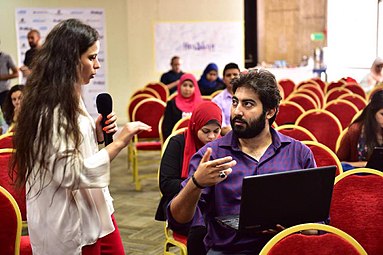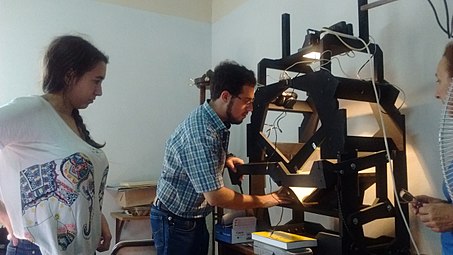User:MCruz (WMF)/Sandbox/Newsletter/2018/5/15/Draft
Have just a topic in mind? Suggest on the corresponding section. Thanks!
Frontpage[edit]
How can we best support leadership in the Wikimedia movement?[edit]
- Title: Crowdsourcing leadership: how we are approaching this in the movement.
- Opening text (35 words):
- How do we understand and describe peer mentoring and leadership in our movement? How can we best support it? In this story, we share what we learned from the Leadership Development Dialogue.
- Intro text (goes before images):
- Images (3):
- Descriptive text (250-300 words max):
When we started working in capacity development with community organizers, we realized that for every leader one might identify, there are dozens within the Wikimedia movement who might also step up to lead, if given access to the right resources and encouragement. The Community Engagement department currently focuses on giving community members access to resources, and building networks among them for peer-exchange, in order to help volunteer program leaders and affiliate coordinators reach their own goals as efficiently and effectively as possible. We went from training 23 program leaders in 2013, to training over 250 program leaders towards the end of 2017. In terms of resource development, we started by creating an evaluation portal, and then moved on to building a single point of entry for all Wikimedia-related resources, the Wikimedia Resource Center. There is, still, some room for improvement; specifically, to create a more transparent and shared space for developing leadership within the movement.
How do we understand and describe peer mentoring and leadership in our movement? And then, how can we design opportunities in a way that better supports leaders to learn from one another? Since Wikimedia is inherently leadership oriented, we need to find better avenues to support community organizers development. With this in mind, we started the Leadership Development Dialogue.
This dialogue consisted of 2 in-person events, 1 online consultation; where 100 people took part, 79 of which were community members. Once the dialogue ended, we hosted 4 focused conversations on specific leadership themes.
What we learned will inform our approach to capacity development. Some key findings are:
- For the question Who should we support?, the top categories for responses were People with responsibility, On-wiki curators, and People who drive collaboration online and offline, and Mentors and change makers.
- For the question What skills should we develop?, the top three categories of responses were How to be collaborative, A positive mentality, and How to teach and inspire.
- For the question How else can we support leadership development?, there were two overarching categories: focusing on empowering leaders (support peer exchange, help people step into leadership, train-the-trainers, among others), and online opportunities and resources (more online training opportunities, more skills and materials for follow up in home communities, outside certifications, among others).
We invite you to read the report on the Leadership Development Dialogue page, watch the presentation and dialogue, and leave comments on the talk page! In the report you are going to find information to more questions, like What should we call leaders?, and other responses that we left out from the story.
- Further reading (links):
[edit]
- Title:
- Opening text (35 words):
Your community runs programs and events in innovative ways. Help other communities learn from your practices, by writing a case study about those programs. Nichole Saad explains why we need your help collecting case studies.
- Intro text (goes before images):
- Images (3):
- Descriptive text (250-300 words max):
For programs in the Wikimedia movement, case studies are one of the most important resources we have. [1] When I first joined the education team at the Wikimedia Foundation,I went to the case studies page on the Education Portal, to familiarize myself with the Wikimedia movement, and how programs contribute to the movement. I was surprised by what I found there, because the case studies were more like vignettes. They were not at all like case studies I had worked with in previous organizations, where this type of resource can tell you about how a project happened, the context in which it happened, and what learning happened as a result of the project. I also knew that the case studies didn’t seem to represent the breadth and depth of the Education Programs. In just my first few months, I discovered many amazing stories from talking to community members and reading the newsletter. The case studies on Outreach Wikimedia almost exclusively represented American educators at the university level. It was clear to me, that these materials really needed an update.
This is why Alex Stinson, GLAM strategist, and myself devised a campaign to try to collect new case studies for Wikimedia programs. We want a collection of stories representative of what is happening ‘’now’’ within the movement, and that were not only descriptive, but helpful to anyone who wanted to know more about how programs work, and how they can be more successful. Since we launched the campaign, we learned that we underestimated the time and complexity of writing a case study. This is why we are changing our approach: we are now working with program leaders one on one, asking them to help us collect stories that represent the depth and complexity of programs that we know exist around the world.
Help us identify and work with program leaders like you! We will be hosting online and offline clinics over the course of 2018, to help you and your collaborators draft high quality case studies that we can use in a new brochure that will replace our outdated ones. If you would like to submit a case study, or participate in the case study clinics to document your program, get in touch with us via email to nsaad![]() wikimedia · org and astinson
wikimedia · org and astinson![]() wikimedia · org, and at events like Wikimedia Conference, and Wikimania.
In the meantime, you can still submit case studies through the input boxes on our Case studies landing page.
wikimedia · org, and at events like Wikimedia Conference, and Wikimania.
In the meantime, you can still submit case studies through the input boxes on our Case studies landing page.
- References
- ↑ See outcomes of survey at https://commons.wikimedia.org/wiki/File:Education_Program_Survey_Report_January_2018.pdf&page=53
- Further reading (links):
- Case studies landing page
Stay tuned[edit]
Blogs[edit]
- Descriptive text (70-80 words):
- Descriptive text (70-80 words):
Calendar[edit]
A Program in the Spotlight[edit]
- Title:
- Tagline:
- Images / media: (3 media files to illustrate your story)
- Descriptive text: (250 - 300 words)
In 2016, the Global Reach team at the Wikimedia Foundation conducted a phone survey that revealed only 21% of Nigerian population, Africa largest country with over 190 million residents, is aware of Wikipedia. With this data in mind, and the desire to reach a larger audience with just one shot at the target, propelled the design of WikiRadio program with the aim of propagating the awareness of Wikipedia as a tool that supports open knowledge, and also to correct many myths behind the use of the project in Nigeria.
Wikimedia User Group Nigeria has partnered with two major radio stations in the country. The first phase of this project premiered on Nigerian radio waves in the month of January, 2016, called Time-Out with Wikipedians on Blackface Radio station. The program successfully recorded 14 live episodes of discussions with Wikipedian and Non Wikipedian alike within and outside of Nigeria, that talked about how Wikipedia supports their works and how they have been contributing to Wikipedia. An average of 7 to 8 listeners phoned in on weekly basis to talk with any of our invited guest on various questions and comments relating to Wikipedia. Invited guests for this program include: University lecturers, local wikipedians, non-local ikipedians, politicians, and more.
In the year 2017, we launched the new partnership with WFM91.7, the first female-oriented radio station that enjoys over 40 million active listeners in major cities in Nigeria. The program, called Wiki Loves Women Radio, is structured to be a 30 minutes weekly live emission which features Nigerian women that have made a mark in their chosen career. The concept was designed to increase and improve contents about Nigerian women on Wikipedia. With a total of 4 interviews per month, this content will be published on some of the leading media houses in Nigeria, and also used as sources for creating and improving biographies of Nigerian women on Wikipedia. The program also has a session to share information about Wikipedia and its sister projects.
The implementation of the project has come with many blessing to the Nigerian community. Since the start of the project, our user group member base has increased tremendously. The program also serves as a platform for training some of our interested members in radio broadcasting. We are working to create more awareness about Wikipedia; without a doubt, since the program started, the idea of a Wikimedia community in Nigeria is not so strange to most of our audience
- View more: (2 - 3 links)
Leave your mark on Meta[edit]
IdeaLab[edit]
- Descriptive text (30-45 words):
- Image
- Link
AffCom corner[edit]
- Descriptive text (90 words): Every 12 months AffCom renews its team through 2 election processes (mid-year and year-end) of new members that replace the expiring offices. In addition to presenting themselves and receiving community support, the candidates answer general questions about the future role of the affiliates within the movement, about concrete work together to do with the partners on common initiatives and projects and specific questions asked by Wikimedians. By December 31, 2017, 9 wikimedians have applied to become members of the committee. Voting followed and soon the results will be made public.
- Image: AffCom with the WMCON organizers
- Link: Affiliations Committee/Candidates/December 2017











